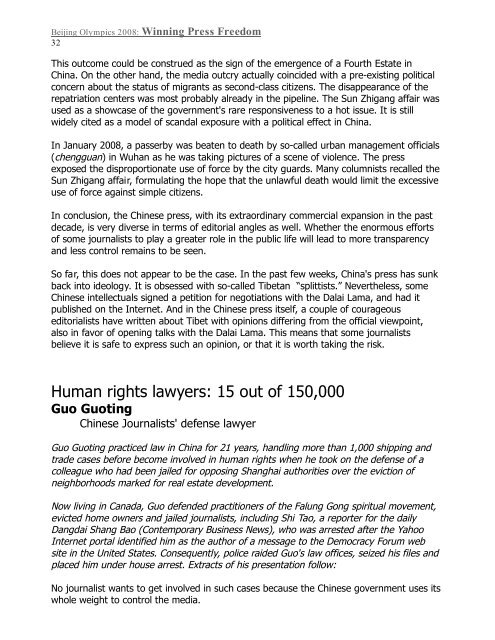Beijing Olympics 2008: Winning Press Freedom - World Press ...
Beijing Olympics 2008: Winning Press Freedom - World Press ...
Beijing Olympics 2008: Winning Press Freedom - World Press ...
You also want an ePaper? Increase the reach of your titles
YUMPU automatically turns print PDFs into web optimized ePapers that Google loves.
<strong>Beijing</strong> <strong>Olympics</strong> <strong>2008</strong>: <strong>Winning</strong> <strong>Press</strong> <strong>Freedom</strong><br />
32<br />
This outcome could be construed as the sign of the emergence of a Fourth Estate in<br />
China. On the other hand, the media outcry actually coincided with a pre-existing political<br />
concern about the status of migrants as second-class citizens. The disappearance of the<br />
repatriation centers was most probably already in the pipeline. The Sun Zhigang affair was<br />
used as a showcase of the government's rare responsiveness to a hot issue. It is still<br />
widely cited as a model of scandal exposure with a political effect in China.<br />
In January <strong>2008</strong>, a passerby was beaten to death by so-called urban management officials<br />
(chengguan) in Wuhan as he was taking pictures of a scene of violence. The press<br />
exposed the disproportionate use of force by the city guards. Many columnists recalled the<br />
Sun Zhigang affair, formulating the hope that the unlawful death would limit the excessive<br />
use of force against simple citizens.<br />
In conclusion, the Chinese press, with its extraordinary commercial expansion in the past<br />
decade, is very diverse in terms of editorial angles as well. Whether the enormous efforts<br />
of some journalists to play a greater role in the public life will lead to more transparency<br />
and less control remains to be seen.<br />
So far, this does not appear to be the case. In the past few weeks, China's press has sunk<br />
back into ideology. It is obsessed with so-called Tibetan “splittists.” Nevertheless, some<br />
Chinese intellectuals signed a petition for negotiations with the Dalai Lama, and had it<br />
published on the Internet. And in the Chinese press itself, a couple of courageous<br />
editorialists have written about Tibet with opinions differing from the official viewpoint,<br />
also in favor of opening talks with the Dalai Lama. This means that some journalists<br />
believe it is safe to express such an opinion, or that it is worth taking the risk.<br />
Human rights lawyers: 15 out of 150,000<br />
Guo Guoting<br />
Chinese Journalists' defense lawyer<br />
Guo Guoting practiced law in China for 21 years, handling more than 1,000 shipping and<br />
trade cases before become involved in human rights when he took on the defense of a<br />
colleague who had been jailed for opposing Shanghai authorities over the eviction of<br />
neighborhoods marked for real estate development.<br />
Now living in Canada, Guo defended practitioners of the Falung Gong spiritual movement,<br />
evicted home owners and jailed journalists, including Shi Tao, a reporter for the daily<br />
Dangdai Shang Bao (Contemporary Business News), who was arrested after the Yahoo<br />
Internet portal identified him as the author of a message to the Democracy Forum web<br />
site in the United States. Consequently, police raided Guo's law offices, seized his files and<br />
placed him under house arrest. Extracts of his presentation follow:<br />
No journalist wants to get involved in such cases because the Chinese government uses its<br />
whole weight to control the media.





